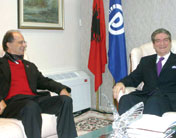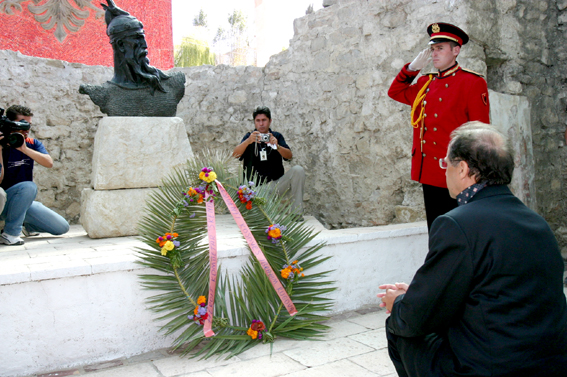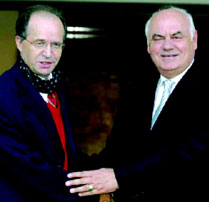LEZHE, 10 sept /ATA/ Par M.Malja/ - Le président de la
Kosova, Ibrahim Rugova, a déposé aujourd'hui un gerbe de fleurs
au pied du mémorial du héros national d'Albanie, Georges
Castriota Skanderbeg, ą Lezhe.
"Devant le mémorial de notre héros national, Skanderbeg,
j'ai un sentiment de fierté pour la nation albanaise, pour son
avenir au sein de la grande famille européenne et l'indépendance
de la Kosova", a déclaré Rugova ą la suite de cette cérémonie.
Data e Publikimit: 10/09/2004
http://www.ballkan.com/
Berisha-Rugova: Pavarėsia, zgjidhja e vetme
|
---------------------------------------------------------------------------
ATDHEU - 09/09/2004 - Kryetari i PLL Spahiu takon presidentin Ibrahim Rugova
Spahiu: PLL do tė vazhdojė tė kontribuojė nė maksimumin e saj pėr Pavarėsinė e Kosovės
Presidenti i Kosovės Dr. Ibrahim Rugova zhvilloi mė 9 shtator njė takim pune nė Rezidencėn e Familjes Mbretėrore me Mbretin Leka I-rė, ku tė pranishėm ishin Princi Leka, kryetari i PLL z.Ekrem Spahiu dhe deputetėt e Grupit parlamentar tė LZHK. Kryelegalisti Spahiu nė fjalėn e tij u shprehu mirėseardhjen z.Rugova dhe anėtarėve tė delegacionit qė e shoqėron, si dhe bėri vlerėsimet dhe urimet pėr vizionin e tij dhe qendrimin konsekuent pėr pavarėsimin e Kosovės. Spahiu theksoi se PLL ka qenė, ėshtė dhe do tė jetė e vendosur pėr t'i kontribuar Ēeshtjes kombėtare dhe nė veēanti pavarėsimit tė Kosovės.
"Ne kemi patur njė kosto jo tė vogėl politike pėr qėndrimet tona pėrsa u pėrket trojeve etnike, por megjithatė nuk mund tė pranojmė qė tė shkelen pafundėsisht tė drejtat e shqiptarėve, nė emėr tė stabilitetit tė kėtij rajoni", - u shpreh z.Spahiu. "Ne jemi tė bindur se, sa mė shpejt tė arrihet Pavarėsia e Kosovės, aq mė shumė do tė ndihmonte nė stabilitetin e rajonit".
Spahiu u ndal edhe nė zgjedhjet e ardhshme nė Kosovė. Ai tha se ato janė tė njė rėndėsie tė veēantė, si pėr shqiptarėt e Kosovės, ashtu edhe pėr ndėrkombėtarėt. "Realisht ne kemi se ē'mėsojmė nga Kosova pėrsa u pėrket zgjedhjeve, pasi zgjedhjet e zhvilluara deri tani nė Kosovė, si pėr pushtetin qendror edhe pėr atė vendor, kanė qenė brenda standardeve demokratike dhe tė pranuara nga tė gjitha palėt konkurruese", ėshtė shprehur z.Spahiu. "Madje, - i ka ndėrmendur z.Rugova se, - ju keni qenė mjaft bujar edhe me partitė e tjera, kur i keni bėrė thirrje popullit tė mos votojnė vetėm pėr LDK, por edhe pėr partitė e tjera". "Fatkeqėsisht, nė Shqipėri ngjet e kundėrta. Kėtu votat manipulohen dhe pėr rrjedhojė nuk dalin pushtete legjitime".
"Por nisma dhe drejtimi i LZHK nga vetė Mbreti Leka I, - ka thėnė Spahiu - ėshtė mirėpritur nga shumica e shqiptarėve, dhe na jep shpresė qė edhe nė Shqipėri, mbas zgjedhjeve parlamentare, tė kemi njė qeveri tė dalė si produkt i votės sė lirė".
Spahiu ka nėnvizuar se "kjo do tė ishte shumė e dobishme jo vetėm pėr Shqipėrinė, por edhe pėr Kosovėn e hapėsirėn tjetėr shqiptare". "Sepse sa mė i fortė tė jetė shteti shqiptar, aq mė me ndikim do tė jetė ky nė procesin e pavarėsimit tė Kosovės".
Z.Rugova nė fjalėt e tij ka shprehur vlerėsimet e qendrimeve politike tė Legalitetit, si brenda vendit edhe nė diasporė.
"Atdheu"
------------------------------------------------------------------
Data e Publikimit: 09/09/2004 http://www.ballkan.com/

